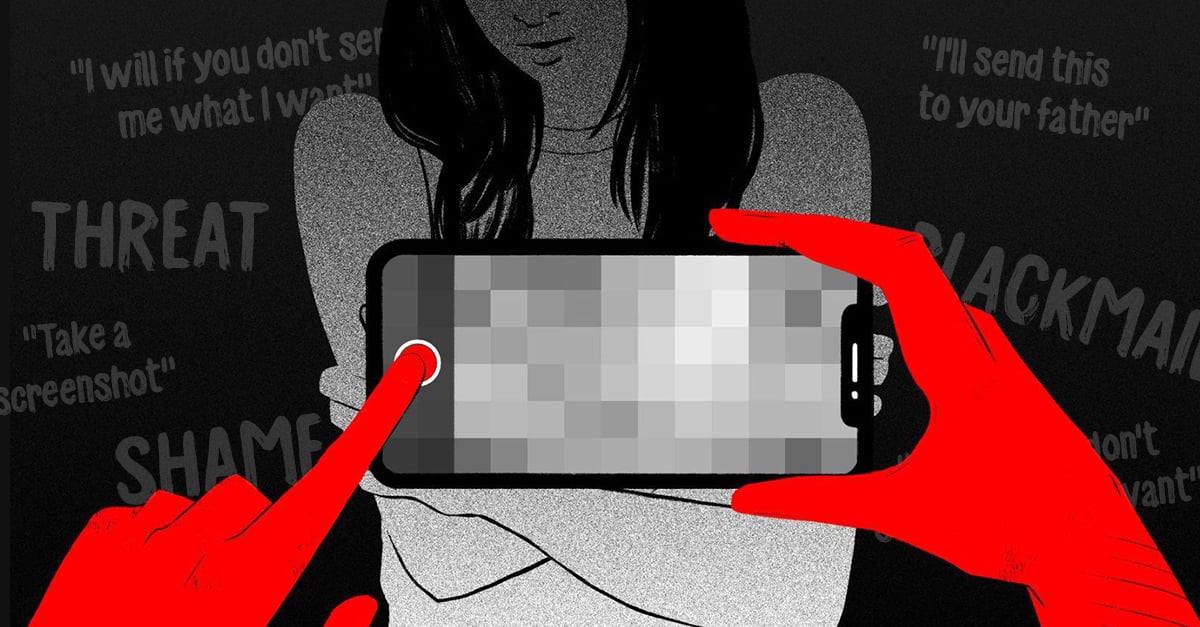
“Piyumi* and Kavishka* are both 17, and have been in a relationship for six months,” began Tracy Holsinger, the founder and director of Mind Adventures Theatre Company, as she explained to Roar Media the storyline of one of her company’s forum theatre productions, Consent and Complicity.
Based on true events, the story goes like this:
Kavishka is ready for a physical relationship and has been asking Piyumi—with increasing frequency—to have sex with him. She has refused, and continues to do so, for she is not ready. Kavishka asks her for nude pictures, which she sends him. Once he receives them, he begins to blackmail her, threatening to send them to her father if she continues to resist and does not have sex with him. Believing this to be an empty threat and unable to believe that her boyfriend would do such a thing, Piyumi maintains the position that she is not ready. But Kavishka does what he threatened to do; he sends Piyumi’s father a picture of her in a towel. What ensues is a scene of beating and derogatory name calling. Piyumi’s mother does nothing to stop her father’s assault. Afterwards, Kavishka calls Piyumi to find out what happened—to find out what the results of his actions were. He appears to gain deep satisfaction on hearing that Piyumi was beaten for the pictures. Emboldened, he then threatens to send more pictures to her father if she does not have sex with him.
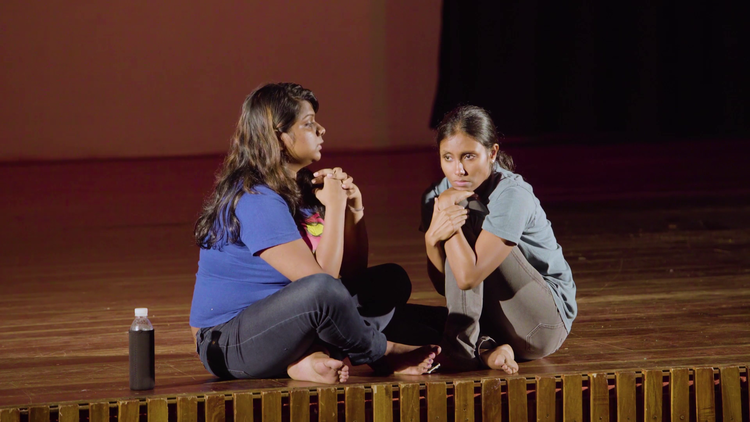
Consent and Complicity, a production that was made possible by the British Council’s Women Of The World ‘Voices and Choices’ grant in 2018, took place in the intimate space of the Punchi Theatre, from January 31 to February 2 of this year. The play falls within the genre of forum theatre—an interactive form of drama in which the audience is directly engaged and involved in deciding the direction of the play together with the actors, and sometimes also taking the role of actors on stage. Created as a tool for social change by Brazilian theatre practitioner, drama theorist and political activist, Augusto Boal, forum theatre is intended to activate the critical consciousness of the spectator, generating dialogue, discussion, and ultimately action.
Holsinger explained how this interactive form of theatre was used by educators, therapists, community organisers, and social workers worldwide to address a range of social issues and how this particular play functioned to involve the audience in figuring out solutions to the complicated issue of cyber sexual violence.
The Mind Adventure Theatre Company’s process is to present a 15-minute play that highlights a social problem to an audience, and once the problem is established, the play is paused. A moderator asks the audience for suggestions about how the problem could be resolved, and the following scenes are then played out in accordance with these suggestions. “We all work together to try and resolve the problem,” she said.
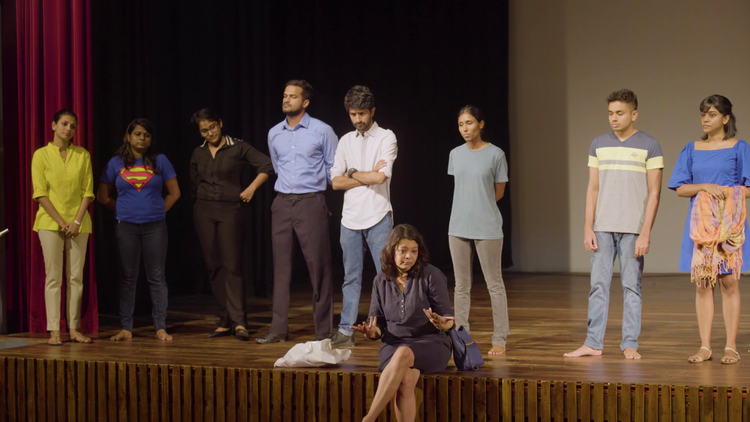
Mind Adventures Theatre Company was inspired to put on this production by the work of two organisations—The Grassrooted Trust and Shanthi Margam—both of which frequently flag instances of cyber sexual harassment, especially amongst teenagers. As a mother of two teenagers, Holsinger was motivated to highlight this growing issue.
Cyber Sexual Harassment
Cyber sexual harassment is a prominent issue worldwide, with the spreading of nude photos without the permission of the subject(s), becoming a growing concern in Sri Lanka.
Hans Billamoria, a founding member of The Grassrooted Trust, who has followed, investigated, and agitated against this issue for several years, highlighted a disturbing trend in the way cyber sexual violence is increasingly committed in the country.
“What we see is an increasingly systematised way in which nude photos are collected, categorised and disseminated,” he told Roar Media. “There are databases—Dropbox, which was the latest—in which these photos are collected and stored, categorised based on the angles of the shot, what body parts they show, etc.” He noted that young boys who were in a relationship or had recently gone through a break up would be prime targets, approached by sexual violence perpetrators and asked to send nude photos of their ex-girlfriends in exchange for full access to this database of pictures.
In addition to such databases, cyber sexual violence is predominant on social media sites, such as Facebook.
“Some of the Facebook pages are titled with Sinhala phrases, yet not written in the Sinhala language, but presented phonetically in English. For this reason, these pages slip through Facebook’s community standards, as they can’t be detected for the derogatory titles they have,” Billamoria said, explaining how the content on these pages—pictures of school girls that had been copied from individuals’ profiles—would not be flagged as inappropriate content as they do not necessarily display anything explicit.
“It wasn’t until Facebook moderators arrived in Sri Lanka and we were able to meet them and explain this to them that they realised how widespread this issue is, and how often it goes undetected,” he said.
Speaking of the larger social context in which this issue takes place, he talked about the prominence of pirimi kama (masculinity) and how certain problematic behaviours and attitudes are instilled in boys from a young age.
He commented, “whenever I feel scared or sad, the emotion that comes out is anger. This is the way in which boys are socialised. Expressing and exploring emotions is seen as feminine and emasculating, so after a break-up, young boys have learned to process emotions such as sadness and hurt by becoming angry and seeking revenge.”
It is important to bear in mind that it is not exclusively girls and young women who become targets and victims of cyber sexual violence. Billamoria reminds us that boys are frequently victimised as well, and often fear additional prosecution due to the illegality and stigma surrounding homosexuality in the country.
Training Police Officers To Deal With Complaints Of Cyber Violence
On February 28, Women In Need—a non-profit organisation fighting domestic violence, rape, child abuse, and other forms of violence (GBV) faced by women and girls—collaborated with the Sri Lanka Police, particularly the Cyber Crimes Division and the Women and Children’s Bureau, to launch a Standard Operating Procedure (SOP) for the Police in addressing complaints of cyber harassment.
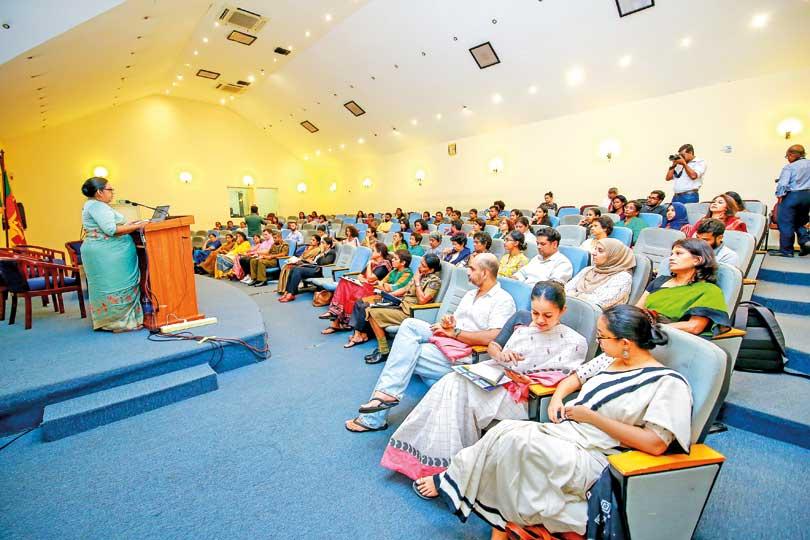
The current process of filing complaints has been reported to be bureaucratic and ineffective, often resulting in many who began the process of filing a complaint deciding to drop their cases.
Attorney-at-Law, Ermiza Tegal, who works on numerous human rights related projects around the country, explained that, “Standard Operating Procedures are a useful tool for government institutions as they introduce consistency and improve the quality of services. They ensure that the correct facts are evaluated and reduce arbitrary decision making.”
She described how the SOP for Police Officers highlights what to expect when dealing with a complainant, and how to ensure that re-victimisation does not take place.
She further noted obstacles many complainants face when reporting cases of cyber violence; having to travel to Colombo to lodge cyber violence complaints (and follow up on them), as well as the fact that perpetrators often rely on the complainant facing embarrassment or shame, which prevents them from reporting the violence or receiving the support he or she needs from family and friends, to make an official complaint.
Tegal noted how, “the SOP deals with this aspect and guides police officers on how to ensure a non-judgmental and non-embarrassment causing process to facilitate complaints and successful investigations and prosecutions.”
The SOP thus promotes a victim-centred approach by using available laws such as the Protection of Victims of Crime and Witnesses Act, “which will build victim confidence in the law enforcement process and will reduce impunity that perpetrators currently appear to enjoy,” Tegal commented.
Speaking about the laws that the SOP draws from, she commented “it firstly ensures that the Police Officer’s actions uphold the Constitution,” and then listed the available legal tools that it utilises to deal with properly investigating and prosecuting cyber violence. These include the Penal Code, the Evidence Ordinance, the Evidence (Special Provisions) Act, the Electronic Transactions Act, the Computer Crimes Act and the Obscene Publications Act.
Tegal commended the Sri Lanka Police, commenting “this is a timely and proactive measure taken to address a rising societal problem and the institution must be applauded for taking steps to respond.”
Continuing To Raise Awareness To Prevent Cyber Sexual Harassment
While such structural changes and legal advances signal that important steps are being taken to address failures in response mechanisms, it is important that efforts to raise awareness on this topic and all its dimensions continue to grow.
“Parents generally seem more concerned about their own reputations and what the neighbours will think, as opposed to how to help and support their children when faced with situations like this,” Holsinger said.
She told Roar Media that responses from the audiences to Consent and Complicity had been overwhelmingly positive. “Most people tell us it should be performed more, especially in schools. We are in the process of getting the show approved by the Ministry of Education.”
On a closing note, she commented, “instead of shaming young girls in particular, and telling them that their lives are ruined, we should talk about how to move forward after such an experience. We should look at young men and at what makes them offer such violence to women.”
Cyber violence is a symptom of larger social issues related to gender-based violence and a lack of conversation on the topics of sexual health, bodily integrity and autonomy.
“We need to have conversations about the outdated notions of virtue that seem to pervade our society,” emphasised Holsinger. “We need to talk about why there is such shame attached to nudity. It is an unhealthy way to think about our bodies. Very often, it is the shame that causes young people in these situations to take their own lives.”
As a part of this project, Mind Adventures Theatre Company has created a questionnaire on attitudes related to gender and sexuality, which people are encouraged to fill out, and which they can do so anonymously. This questionnaire aims to gather data to add to statistics in the field, with the target of informing future advocacy efforts. The findings will be made available for those wishing to access them.


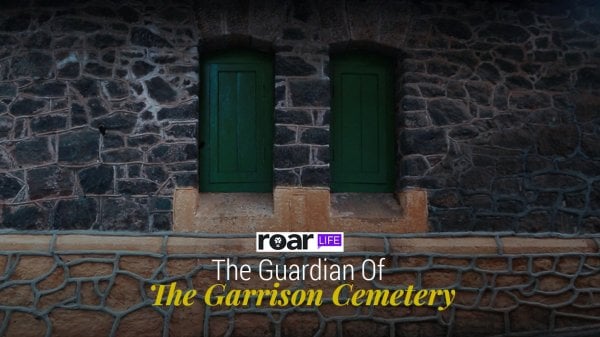



.jpg?w=600)
